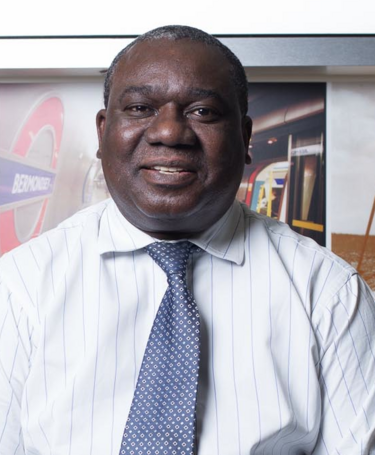
Supporting women in quality

Lionel Abbey, CQP FCQI, explains how he has helped support Akorfa Wuttor, Assistant Lecturer at University of Professional Studies, Accra (UPSA), Ghana, in her career, and how UPSA’s quality management course is attracting more women into quality roles across Africa.
How did you and Akorfa first meet?
Lionel Abbey: I met Akorfa Wuttor after she was offered a place on a new two-year Masters of Business Administration (MBA) programme in Total Quality Management (TQM), which I co-developed with Professor Goski Alabi – a CQI member and former Dean of the Graduate school University of Professional Studies, Accra (UPSA).
The MBA programme in TQM was designed to meet the professional needs of managers in the public and private sectors in Africa, and it was the first programme of its kind in Africa. It covers the CQI’s Competency Framework and supports the development and growth of organisations through the principles of quality management. Akorfa Wuttor was part of the first group of students at UPSA to take the course. I had the privilege of leading and lecturing the group, including Akorfa, on two of the modules, which were Quality Management Systems/Excellence Models and Management Systems Audit.
Did you mentor Akorfa? What made you decide to take Akorfa under your wing after she completed her degree at UPSA?
LA: I wasn’t her formal mentor, however, Professor Alabi and I provided mentoring and professional advice to all the graduates during their programme and we encouraged some of them to become members of the CQI. This was a journey that I started with Akorfa.
Akorfa developed a key interest in auditing during the course and as a result of that, she volunteered to coordinate the live audit programme for the next group of students. She ended up joining my team as a Graduate Teaching Assistant until she was fully appointed by UPSA in 2016 as an Assistant Lecturer.
As a quality professional, what advice and knowledge did you pass onto her?
LA: Invest in your professional development and proactively seek career opportunities and ways to improve as a professional.
Could you tell us more about the quality course that you co-teach with Akorfa at UPSA?
LA: It is a two-year MBA programme in Total Quality Management. The purpose of the programme is to contribute to the development of effective leaders who can support Ghana and other parts of Africa by asserting their rightful places in the global economic landscape through the use of the principles and philosophy of quality management. We co-teach the Quality Management Systems/Excellence modules which takes place during the first year of the course, in the second semester.
How would you describe your working relationship with Akorfa?
LA: Our relationship is not always the explicit, established and formalised job-specific mode or style. We talk about our family life, our children, and how she is coping with her job, and running her household.
What challenges do you think women working in quality are facing in Ghana?
LA: The quality profession is one of the new and developing ones in Ghana, but as with many other professions, gender stereotypes still operate. Nobody should be treated differently, whether they are a man or a woman, and this is something we are trying to raise awareness of.
Is the quality industry very male dominated in Ghana and other neighbouring countries?
LA: There are women in top level quality roles in Ghana. The percentage of women in mid-level positions is increasing. I think the future looks promising because of the number of women who are in mid/senior level management roles that have enrolled onto the MBA programme. With regard to our neighbouring countries, I think they are more male dominated, compared to Ghana.
How have you and Akorfa helped to raise the profile of women working in the quality profession?
LA: The percentage of women in our past and current TQM classes have been very encouraging. We have encouraged around 50 per cent of them to take part in professional activities and to also promote World Quality Day (WQD) and the CQI in Ghana.
What was one of the biggest challenges you have both encountered at UPSA and how did you overcome it?
LA: Most of the senior management teams at UPSA are open to improvement and quality initiatives, however, the processes and procedures involve a series of meetings before approval, which can be frustrating at times. To overcome this challenge, we have been collaborating with stakeholders in advance of meetings for their buy-in. It worked with getting approval to apply for CQI accreditation for the MBA programme.
Are you collaborating with Akorfa on any other projects in the foreseeable future? If so, what are they?
LA: This is top secret at the moment, but it involves producing and publishing a professional magazine focused on quality management in Ghana and other parts of Africa. I will be working with Akorfa on some of the technical content that will be featured in the publication.
What advice would you give to women who are looking to progress into more senior management roles in quality?
LA: Introducing more women at leadership level simply introduces broader perspectives and new ways to manage problems. Diversity is key for a successful organisation.
I would advise women to establish a robust work ethic and go above and beyond what is expected of their job role. Cultivate a veneer of toughness, refuse to take setbacks personally, and have the courage to dissent.
Akorfa Wuttor was featured in Women in Quality (p16) of Quality World March.